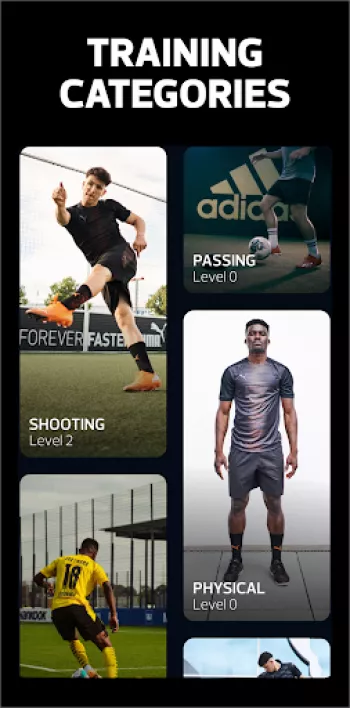Apps Home

box-to-box: Soccer Training
Unveiling the Essence of Street Soccer: Where Passion Meets Skill
Street soccer, a dynamic and electrifying variant of the traditional game, is not merely a sport but a cultural phenomenon that thrives on the raw passion and innate skill of its players. Unlike the structured environment of professional soccer, street soccer is characterized by its unpredictable nature, played in unconventional urban landscapes, making every game a unique experience. It’s more than just a game; it's a testament to creativity, resilience, and the cultural melting pot that cities offer. Players often gather in abandoned lots, parks, alleyways, or actual streets, improvising with whatever resources are available, be it makeshift goals or varying team sizes. This setting births a form of soccer that is fast-paced, intense, and requires a high level of technical proficiency and instinctual decision-making. The surface of the playing area can vary greatly, from concrete to asphalt, each presenting its own set of challenges, enhancing the players’ adaptability and spontaneity. The game is usually played with fewer players than typical association football, allowing for more touches on the ball and an emphasis on individual skill and flair rather than tactical formations or set pieces. This environment nurtures creativity, allowing players to experiment with unorthodox moves and tricks, often drawing inspiration from freestyle soccer and futsal. It’s in this unstructured domain that many great players have honed their skills, mastering control, dribbling, and agility—skills that are less emphasized in structured club play but invaluable in the broader scope of the sport. The immediate feedback from the environment and instant adaptation required in street soccer translates well into advanced gameplay, making it a foundational platform for nurturing world-class talent.
The Role of Technology in Modernizing Street Soccer
While the essence of street soccer remains rooted in its informal and accessible nature, technological advancements have begun to play a crucial role in enhancing the gameplay experience and player development. Applications like "box-to-box" are revolutionizing how players train and improve their skills even without a traditional coach. By offering a plethora of drills and training modules, these apps grant individual players the opportunity to hone their abilities in their own space and at their own pace, bridging the gap between street-level play and professional training regimes. Integrating technologies such as video tutorials and virtual coaches, apps aim to provide personalized feedback, allowing players to assess their performance, track their progress, and set realistic goals. Imagine practicing your juggling or shooting skills with professional guidance—accessible right from your smartphone. Such apps often are developed in collaboration with professional coaches, ensuring that the drills are meaningful and beneficial, covering various aspects of soccer ranging from dribbling techniques to improving stamina and coordination. Gamifying this training process with scorecards and leaderboards motivates players by making training fun and competitive, mirroring the similar atmosphere found in street soccer games. Besides, offering downloadable content from renowned soccer academies, like Borussia Dortmund, gives players a taste of high-level training, pushing their limits further with exclusive drills and training insights. The digital network also creates a community of aspiring soccer players who share achievements and challenges, fostering a supportive and competitive environment that motivates individuals to continually improve and innovate in their playing style.
Training Dynamics: From Street to Professional Soccer
Transitioning from the freestyle-oriented environment of street soccer to the professional playing field presents both challenges and opportunities for players. The informal setting of street soccer nurtures a player’s ability to improvise, react instinctively, and engage creatively with the game, attributes that can give a player distinct advantages at higher levels of competition. However, professional soccer demands discipline, tactical awareness, and physical fitness, skills that may not be as rigorously honed in street play. This transition phase requires players to refine their raw skills and adapt their playing style to fit structured team systems and strategies. Apps like "box-to-box" serve as a valuable bridge in this transition, offering over 200 training drills designed to improve various aspects of a player’s game, from ball control to footwork and stamina. This systematic training approach helps players align their street soccer attributes with professional expectations, ensuring they remain competitive and capable in diverse playing environments. Furthermore, the notion of having a virtual coach allows for personalized training programs that consider the player’s background, skill level, and specific on-field roles. For instance, a virtual coach might tailor a training regimen focusing on developing defensive abilities, passing accuracy, or enhancing acceleration, depending on the player’s position. This approach empowers street soccer players to address their weaknesses, improve their strengths, and ultimately become well-rounded athletes. Additionally, the use of metrics to analyze a player’s performance adds a layer of professionalism to the street soccer culture, encouraging players to think strategically about their development and career trajectory in the sport.
The Cultural Impact of Street Soccer on Global Soccer Trends
Street soccer holds an indelible cultural significance that transcends its identity as merely an athletic activity. From Rio de Janeiro’s favelas to New York City’s boroughs, street soccer serves as a vital social platform where diverse communities engage in a shared passion that unites them beyond linguistic or geographic barriers. The fluid nature of the game fosters cultural exchange and community development, allowing individuals to share unique playing styles influenced by their cultural heritage. This cross-pollination of styles contributes significantly to the evolution of new soccer techniques and strategies, often seen later in professional settings. Street soccer is also instrumental in fostering inclusivity, offering a free and accessible way for people from all backgrounds to learn and excel in the sport without the barriers traditionally associated with organized soccer clubs. The creative flair and improvisational skill seen in street soccer have influenced the professional arenas, inspiring players to incorporate acrobatic moves, no-look passes, and breathtaking dribbles into conventional gameplay. The cultural import of street soccer is also evident in how it shapes player personalities, encouraging adaptability, resilience, and a fierce competitive spirit—traits that are highly valued in professional soccer. Moreover, soccer stars such as Cristiano Ronaldo and Neymar Jr., who started their journeys in street soccer environments, have brought widespread attention to the potential and talent inherent in street soccer, inspiring many young players worldwide. The ripple effect of street soccer’s cultural impact continues to inspire new generations, reinforcing soccer’s global status as a unifying cultural phenomenon.
Expanding Access to Soccer Training: The Role of Apps in Skill Development
The proliferation of soccer training apps has opened up new pathways for individual skill development, making high-quality soccer training accessible to a broader audience regardless of economic background or geographic location. Such platforms have democratized access to sophisticated training techniques and personalized coaching, which was once largely confined to expensive soccer schools or elite clubs. Take, for instance, a platform like "box-to-box," which empowers aspiring footballers by offering a comprehensive suite of training exercises that are easily executable outside traditional training environments. Players can access detailed video demonstrations, understand effective warm-up routines, and follow precise footwork drills—all within their homes' confines or local play areas. Moreover, the interactivity offered by these apps, such as scorecards and leaderboards, not only motivates players to engage continuously but also provides a mechanism for global players to connect, share achievements, and foster a spirit of community and competitive camaraderie. They embody a virtual soccer academy where learning is continuous, dynamic, and deeply engaging without the rigid structures of a traditional soccer setting. By emphasizing fun while learning, such platforms prepare young athletes to tackle the intricacies of professional soccer with joy and passion. Beyond technical skills, these apps inspire players to set goals and recognize milestones in their soccer journey. For instance, players could download advanced training modules curated in collaboration with established soccer clubs, allowing them to undergo rigorous training regimens reminiscent of professional environments. The accessibility of these virtual coaching aids reiterates the importance of ongoing learning and adaptation, essential elements in nurturing the next generation of soccer stars. Aspiring players wishing to refine their skills at home can effortlessly enhance their training with these digital resources on platforms such as Android, ensuring that high-quality soccer education is always within reach. Download for Android.
Share Your Opinion
Your Email Will Not Be Published.
All Rights Reserved © Apps Home 2025
















































Bobby Haney
This is a great soccer training app. Might be the best out there. I have just started using it and one thing I wish was for the personal coach trai...
Youssef Wael
Amazing app to track your soccer stats but only if you are honest with yourself and are ready to put in the hard work needed to get results. You ju...
Ayabonga Mkhize
Really helpful if you want to start training and being better in soccer
Ebraheem Zaidi
Highly recommended. This app is created with great dedication and detail. You can train based on your level,age, and position. I tried it for a mon...
Brendon L
Great mix of still and physical work. This app is the most well-rounded soccer trainer on the market and is an incredible deal. My ONLY complaint i...